Citizenship, Community, and Welfare: An In-Depth Report (LC564)
VerifiedAdded on 2023/06/10
|10
|2948
|387
Report
AI Summary
This report provides a comprehensive analysis of citizenship, community, and welfare, focusing on their interconnectedness and evolution within the context of education. It defines citizenship as a crucial element of society, emphasizing its role in encouraging participation and empowering individuals. The report explores the conceptions of citizenship and various forms of welfare provision, highlighting how they have changed over time, particularly in education. It examines citizenship education, its various forms, and its impact on developing responsible citizens with the necessary knowledge and skills to engage in a democratic society. The report also discusses the importance of civic rights and their protection, underscoring the positive impact on young generations and society as a whole. Furthermore, the report touches upon the legal aspects of citizenship and the rights and responsibilities associated with it, emphasizing the significance of social inclusion and democratic participation.

LC564 Citizenship Community
and Welfare
1
and Welfare
1
Paraphrase This Document
Need a fresh take? Get an instant paraphrase of this document with our AI Paraphraser

Introduction......................................................................................................................................3
Main Body.......................................................................................................................................3
Conclusion.......................................................................................................................................5
2
Main Body.......................................................................................................................................3
Conclusion.......................................................................................................................................5
2
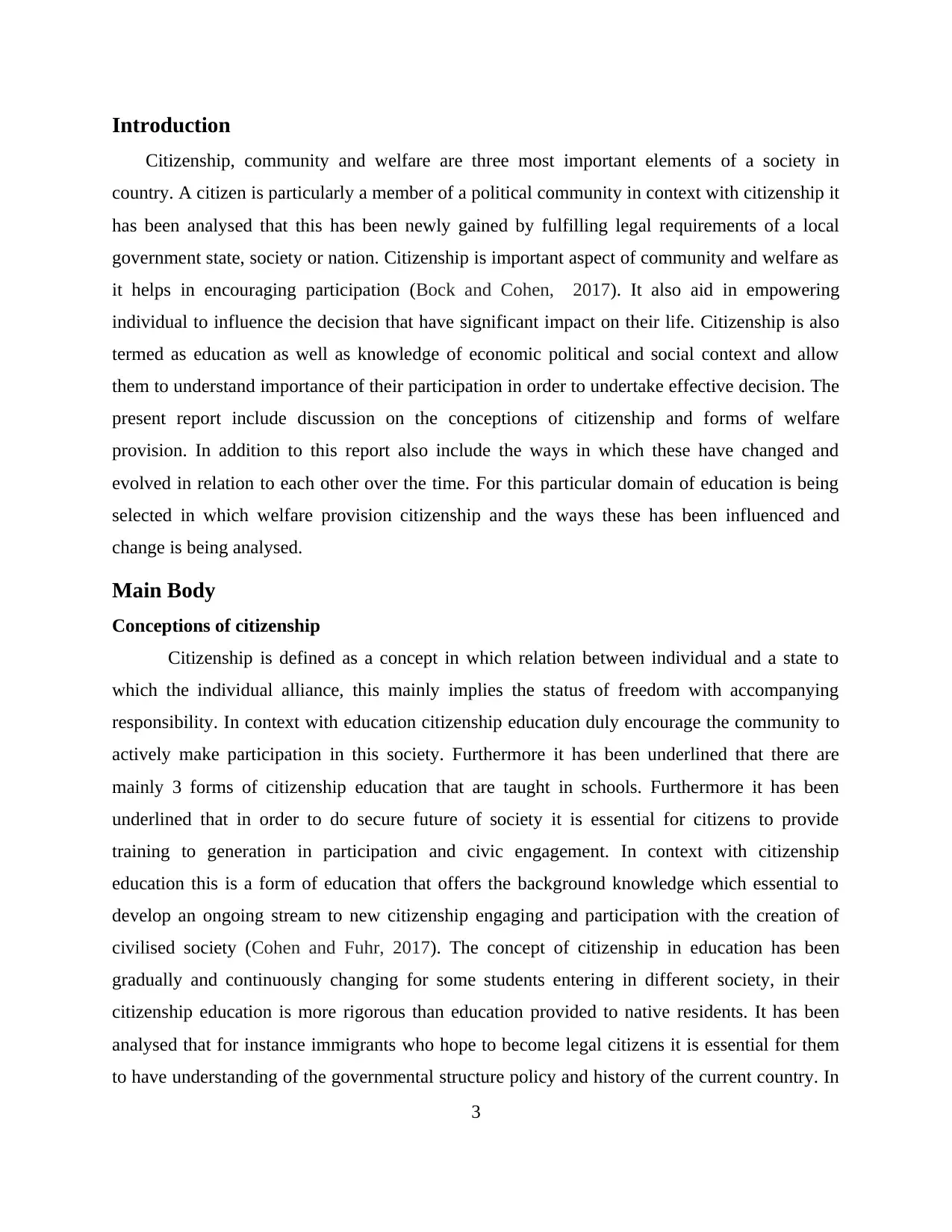
Introduction
Citizenship, community and welfare are three most important elements of a society in
country. A citizen is particularly a member of a political community in context with citizenship it
has been analysed that this has been newly gained by fulfilling legal requirements of a local
government state, society or nation. Citizenship is important aspect of community and welfare as
it helps in encouraging participation (Bock and Cohen, 2017). It also aid in empowering
individual to influence the decision that have significant impact on their life. Citizenship is also
termed as education as well as knowledge of economic political and social context and allow
them to understand importance of their participation in order to undertake effective decision. The
present report include discussion on the conceptions of citizenship and forms of welfare
provision. In addition to this report also include the ways in which these have changed and
evolved in relation to each other over the time. For this particular domain of education is being
selected in which welfare provision citizenship and the ways these has been influenced and
change is being analysed.
Main Body
Conceptions of citizenship
Citizenship is defined as a concept in which relation between individual and a state to
which the individual alliance, this mainly implies the status of freedom with accompanying
responsibility. In context with education citizenship education duly encourage the community to
actively make participation in this society. Furthermore it has been underlined that there are
mainly 3 forms of citizenship education that are taught in schools. Furthermore it has been
underlined that in order to do secure future of society it is essential for citizens to provide
training to generation in participation and civic engagement. In context with citizenship
education this is a form of education that offers the background knowledge which essential to
develop an ongoing stream to new citizenship engaging and participation with the creation of
civilised society (Cohen and Fuhr, 2017). The concept of citizenship in education has been
gradually and continuously changing for some students entering in different society, in their
citizenship education is more rigorous than education provided to native residents. It has been
analysed that for instance immigrants who hope to become legal citizens it is essential for them
to have understanding of the governmental structure policy and history of the current country. In
3
Citizenship, community and welfare are three most important elements of a society in
country. A citizen is particularly a member of a political community in context with citizenship it
has been analysed that this has been newly gained by fulfilling legal requirements of a local
government state, society or nation. Citizenship is important aspect of community and welfare as
it helps in encouraging participation (Bock and Cohen, 2017). It also aid in empowering
individual to influence the decision that have significant impact on their life. Citizenship is also
termed as education as well as knowledge of economic political and social context and allow
them to understand importance of their participation in order to undertake effective decision. The
present report include discussion on the conceptions of citizenship and forms of welfare
provision. In addition to this report also include the ways in which these have changed and
evolved in relation to each other over the time. For this particular domain of education is being
selected in which welfare provision citizenship and the ways these has been influenced and
change is being analysed.
Main Body
Conceptions of citizenship
Citizenship is defined as a concept in which relation between individual and a state to
which the individual alliance, this mainly implies the status of freedom with accompanying
responsibility. In context with education citizenship education duly encourage the community to
actively make participation in this society. Furthermore it has been underlined that there are
mainly 3 forms of citizenship education that are taught in schools. Furthermore it has been
underlined that in order to do secure future of society it is essential for citizens to provide
training to generation in participation and civic engagement. In context with citizenship
education this is a form of education that offers the background knowledge which essential to
develop an ongoing stream to new citizenship engaging and participation with the creation of
civilised society (Cohen and Fuhr, 2017). The concept of citizenship in education has been
gradually and continuously changing for some students entering in different society, in their
citizenship education is more rigorous than education provided to native residents. It has been
analysed that for instance immigrants who hope to become legal citizens it is essential for them
to have understanding of the governmental structure policy and history of the current country. In
3
⊘ This is a preview!⊘
Do you want full access?
Subscribe today to unlock all pages.

Trusted by 1+ million students worldwide
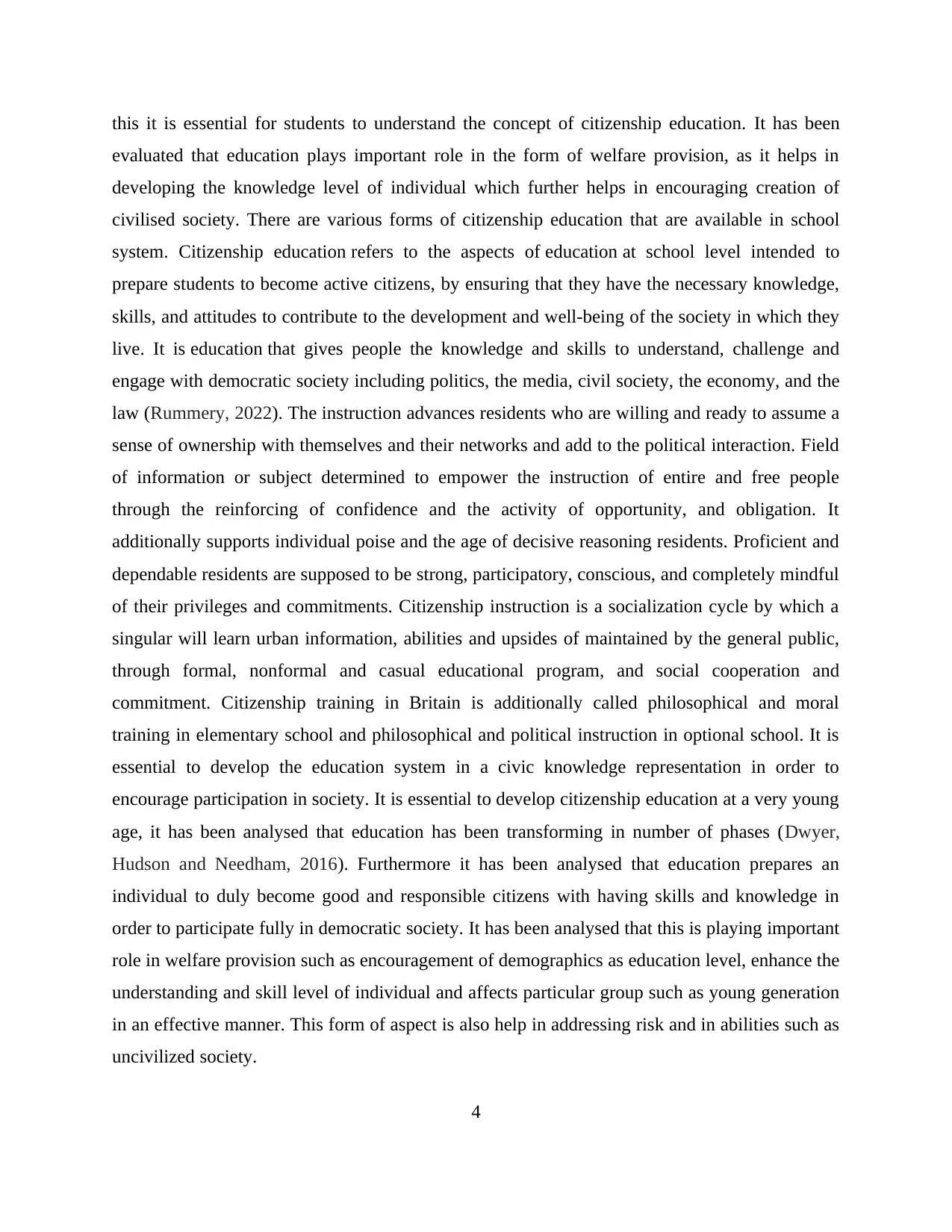
this it is essential for students to understand the concept of citizenship education. It has been
evaluated that education plays important role in the form of welfare provision, as it helps in
developing the knowledge level of individual which further helps in encouraging creation of
civilised society. There are various forms of citizenship education that are available in school
system. Citizenship education refers to the aspects of education at school level intended to
prepare students to become active citizens, by ensuring that they have the necessary knowledge,
skills, and attitudes to contribute to the development and well-being of the society in which they
live. It is education that gives people the knowledge and skills to understand, challenge and
engage with democratic society including politics, the media, civil society, the economy, and the
law (Rummery, 2022). The instruction advances residents who are willing and ready to assume a
sense of ownership with themselves and their networks and add to the political interaction. Field
of information or subject determined to empower the instruction of entire and free people
through the reinforcing of confidence and the activity of opportunity, and obligation. It
additionally supports individual poise and the age of decisive reasoning residents. Proficient and
dependable residents are supposed to be strong, participatory, conscious, and completely mindful
of their privileges and commitments. Citizenship instruction is a socialization cycle by which a
singular will learn urban information, abilities and upsides of maintained by the general public,
through formal, nonformal and casual educational program, and social cooperation and
commitment. Citizenship training in Britain is additionally called philosophical and moral
training in elementary school and philosophical and political instruction in optional school. It is
essential to develop the education system in a civic knowledge representation in order to
encourage participation in society. It is essential to develop citizenship education at a very young
age, it has been analysed that education has been transforming in number of phases (Dwyer,
Hudson and Needham, 2016). Furthermore it has been analysed that education prepares an
individual to duly become good and responsible citizens with having skills and knowledge in
order to participate fully in democratic society. It has been analysed that this is playing important
role in welfare provision such as encouragement of demographics as education level, enhance the
understanding and skill level of individual and affects particular group such as young generation
in an effective manner. This form of aspect is also help in addressing risk and in abilities such as
uncivilized society.
4
evaluated that education plays important role in the form of welfare provision, as it helps in
developing the knowledge level of individual which further helps in encouraging creation of
civilised society. There are various forms of citizenship education that are available in school
system. Citizenship education refers to the aspects of education at school level intended to
prepare students to become active citizens, by ensuring that they have the necessary knowledge,
skills, and attitudes to contribute to the development and well-being of the society in which they
live. It is education that gives people the knowledge and skills to understand, challenge and
engage with democratic society including politics, the media, civil society, the economy, and the
law (Rummery, 2022). The instruction advances residents who are willing and ready to assume a
sense of ownership with themselves and their networks and add to the political interaction. Field
of information or subject determined to empower the instruction of entire and free people
through the reinforcing of confidence and the activity of opportunity, and obligation. It
additionally supports individual poise and the age of decisive reasoning residents. Proficient and
dependable residents are supposed to be strong, participatory, conscious, and completely mindful
of their privileges and commitments. Citizenship instruction is a socialization cycle by which a
singular will learn urban information, abilities and upsides of maintained by the general public,
through formal, nonformal and casual educational program, and social cooperation and
commitment. Citizenship training in Britain is additionally called philosophical and moral
training in elementary school and philosophical and political instruction in optional school. It is
essential to develop the education system in a civic knowledge representation in order to
encourage participation in society. It is essential to develop citizenship education at a very young
age, it has been analysed that education has been transforming in number of phases (Dwyer,
Hudson and Needham, 2016). Furthermore it has been analysed that education prepares an
individual to duly become good and responsible citizens with having skills and knowledge in
order to participate fully in democratic society. It has been analysed that this is playing important
role in welfare provision such as encouragement of demographics as education level, enhance the
understanding and skill level of individual and affects particular group such as young generation
in an effective manner. This form of aspect is also help in addressing risk and in abilities such as
uncivilized society.
4
Paraphrase This Document
Need a fresh take? Get an instant paraphrase of this document with our AI Paraphraser
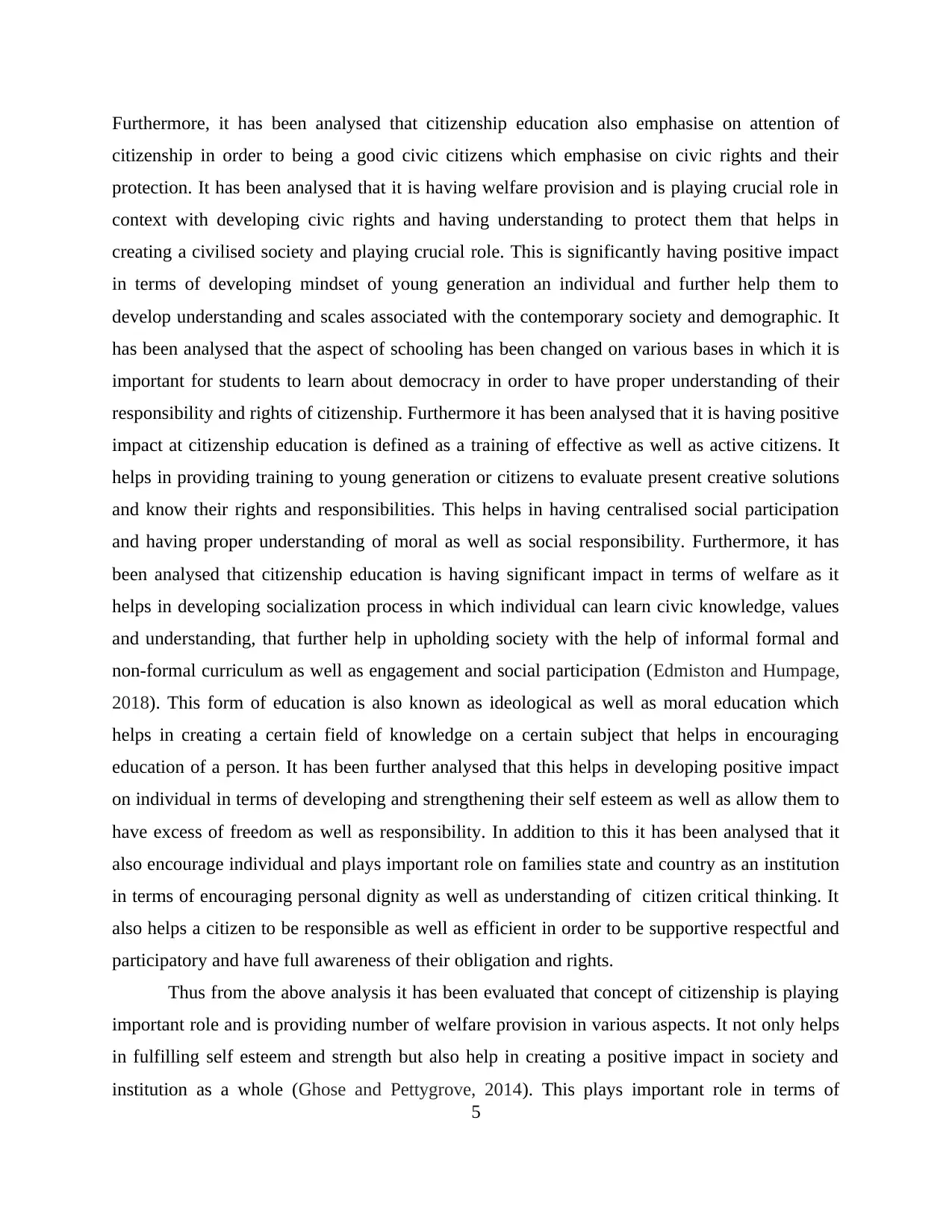
Furthermore, it has been analysed that citizenship education also emphasise on attention of
citizenship in order to being a good civic citizens which emphasise on civic rights and their
protection. It has been analysed that it is having welfare provision and is playing crucial role in
context with developing civic rights and having understanding to protect them that helps in
creating a civilised society and playing crucial role. This is significantly having positive impact
in terms of developing mindset of young generation an individual and further help them to
develop understanding and scales associated with the contemporary society and demographic. It
has been analysed that the aspect of schooling has been changed on various bases in which it is
important for students to learn about democracy in order to have proper understanding of their
responsibility and rights of citizenship. Furthermore it has been analysed that it is having positive
impact at citizenship education is defined as a training of effective as well as active citizens. It
helps in providing training to young generation or citizens to evaluate present creative solutions
and know their rights and responsibilities. This helps in having centralised social participation
and having proper understanding of moral as well as social responsibility. Furthermore, it has
been analysed that citizenship education is having significant impact in terms of welfare as it
helps in developing socialization process in which individual can learn civic knowledge, values
and understanding, that further help in upholding society with the help of informal formal and
non-formal curriculum as well as engagement and social participation (Edmiston and Humpage,
2018). This form of education is also known as ideological as well as moral education which
helps in creating a certain field of knowledge on a certain subject that helps in encouraging
education of a person. It has been further analysed that this helps in developing positive impact
on individual in terms of developing and strengthening their self esteem as well as allow them to
have excess of freedom as well as responsibility. In addition to this it has been analysed that it
also encourage individual and plays important role on families state and country as an institution
in terms of encouraging personal dignity as well as understanding of citizen critical thinking. It
also helps a citizen to be responsible as well as efficient in order to be supportive respectful and
participatory and have full awareness of their obligation and rights.
Thus from the above analysis it has been evaluated that concept of citizenship is playing
important role and is providing number of welfare provision in various aspects. It not only helps
in fulfilling self esteem and strength but also help in creating a positive impact in society and
institution as a whole (Ghose and Pettygrove, 2014). This plays important role in terms of
5
citizenship in order to being a good civic citizens which emphasise on civic rights and their
protection. It has been analysed that it is having welfare provision and is playing crucial role in
context with developing civic rights and having understanding to protect them that helps in
creating a civilised society and playing crucial role. This is significantly having positive impact
in terms of developing mindset of young generation an individual and further help them to
develop understanding and scales associated with the contemporary society and demographic. It
has been analysed that the aspect of schooling has been changed on various bases in which it is
important for students to learn about democracy in order to have proper understanding of their
responsibility and rights of citizenship. Furthermore it has been analysed that it is having positive
impact at citizenship education is defined as a training of effective as well as active citizens. It
helps in providing training to young generation or citizens to evaluate present creative solutions
and know their rights and responsibilities. This helps in having centralised social participation
and having proper understanding of moral as well as social responsibility. Furthermore, it has
been analysed that citizenship education is having significant impact in terms of welfare as it
helps in developing socialization process in which individual can learn civic knowledge, values
and understanding, that further help in upholding society with the help of informal formal and
non-formal curriculum as well as engagement and social participation (Edmiston and Humpage,
2018). This form of education is also known as ideological as well as moral education which
helps in creating a certain field of knowledge on a certain subject that helps in encouraging
education of a person. It has been further analysed that this helps in developing positive impact
on individual in terms of developing and strengthening their self esteem as well as allow them to
have excess of freedom as well as responsibility. In addition to this it has been analysed that it
also encourage individual and plays important role on families state and country as an institution
in terms of encouraging personal dignity as well as understanding of citizen critical thinking. It
also helps a citizen to be responsible as well as efficient in order to be supportive respectful and
participatory and have full awareness of their obligation and rights.
Thus from the above analysis it has been evaluated that concept of citizenship is playing
important role and is providing number of welfare provision in various aspects. It not only helps
in fulfilling self esteem and strength but also help in creating a positive impact in society and
institution as a whole (Ghose and Pettygrove, 2014). This plays important role in terms of
5
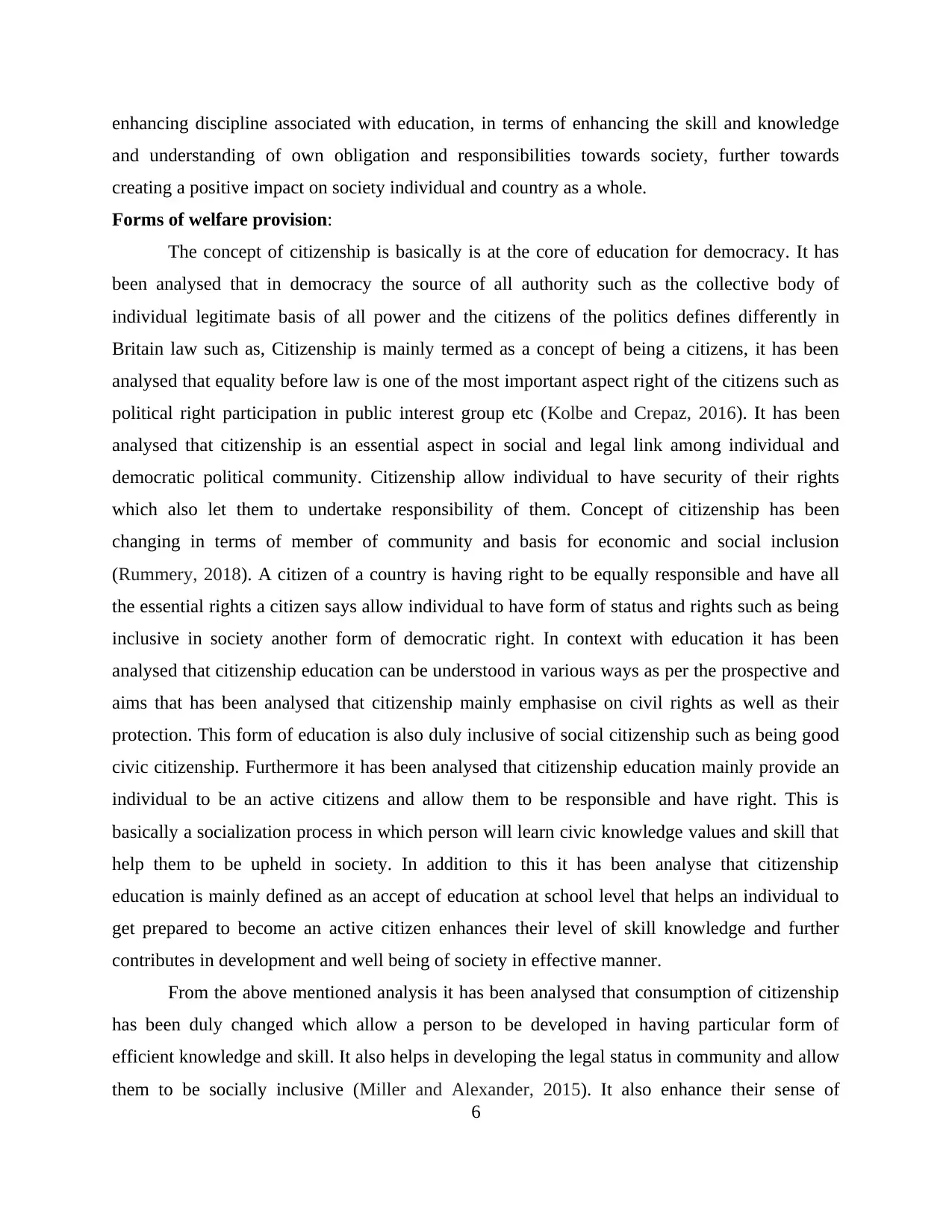
enhancing discipline associated with education, in terms of enhancing the skill and knowledge
and understanding of own obligation and responsibilities towards society, further towards
creating a positive impact on society individual and country as a whole.
Forms of welfare provision:
The concept of citizenship is basically is at the core of education for democracy. It has
been analysed that in democracy the source of all authority such as the collective body of
individual legitimate basis of all power and the citizens of the politics defines differently in
Britain law such as, Citizenship is mainly termed as a concept of being a citizens, it has been
analysed that equality before law is one of the most important aspect right of the citizens such as
political right participation in public interest group etc (Kolbe and Crepaz, 2016). It has been
analysed that citizenship is an essential aspect in social and legal link among individual and
democratic political community. Citizenship allow individual to have security of their rights
which also let them to undertake responsibility of them. Concept of citizenship has been
changing in terms of member of community and basis for economic and social inclusion
(Rummery, 2018). A citizen of a country is having right to be equally responsible and have all
the essential rights a citizen says allow individual to have form of status and rights such as being
inclusive in society another form of democratic right. In context with education it has been
analysed that citizenship education can be understood in various ways as per the prospective and
aims that has been analysed that citizenship mainly emphasise on civil rights as well as their
protection. This form of education is also duly inclusive of social citizenship such as being good
civic citizenship. Furthermore it has been analysed that citizenship education mainly provide an
individual to be an active citizens and allow them to be responsible and have right. This is
basically a socialization process in which person will learn civic knowledge values and skill that
help them to be upheld in society. In addition to this it has been analyse that citizenship
education is mainly defined as an accept of education at school level that helps an individual to
get prepared to become an active citizen enhances their level of skill knowledge and further
contributes in development and well being of society in effective manner.
From the above mentioned analysis it has been analysed that consumption of citizenship
has been duly changed which allow a person to be developed in having particular form of
efficient knowledge and skill. It also helps in developing the legal status in community and allow
them to be socially inclusive (Miller and Alexander, 2015). It also enhance their sense of
6
and understanding of own obligation and responsibilities towards society, further towards
creating a positive impact on society individual and country as a whole.
Forms of welfare provision:
The concept of citizenship is basically is at the core of education for democracy. It has
been analysed that in democracy the source of all authority such as the collective body of
individual legitimate basis of all power and the citizens of the politics defines differently in
Britain law such as, Citizenship is mainly termed as a concept of being a citizens, it has been
analysed that equality before law is one of the most important aspect right of the citizens such as
political right participation in public interest group etc (Kolbe and Crepaz, 2016). It has been
analysed that citizenship is an essential aspect in social and legal link among individual and
democratic political community. Citizenship allow individual to have security of their rights
which also let them to undertake responsibility of them. Concept of citizenship has been
changing in terms of member of community and basis for economic and social inclusion
(Rummery, 2018). A citizen of a country is having right to be equally responsible and have all
the essential rights a citizen says allow individual to have form of status and rights such as being
inclusive in society another form of democratic right. In context with education it has been
analysed that citizenship education can be understood in various ways as per the prospective and
aims that has been analysed that citizenship mainly emphasise on civil rights as well as their
protection. This form of education is also duly inclusive of social citizenship such as being good
civic citizenship. Furthermore it has been analysed that citizenship education mainly provide an
individual to be an active citizens and allow them to be responsible and have right. This is
basically a socialization process in which person will learn civic knowledge values and skill that
help them to be upheld in society. In addition to this it has been analyse that citizenship
education is mainly defined as an accept of education at school level that helps an individual to
get prepared to become an active citizen enhances their level of skill knowledge and further
contributes in development and well being of society in effective manner.
From the above mentioned analysis it has been analysed that consumption of citizenship
has been duly changed which allow a person to be developed in having particular form of
efficient knowledge and skill. It also helps in developing the legal status in community and allow
them to be socially inclusive (Miller and Alexander, 2015). It also enhance their sense of
6
⊘ This is a preview!⊘
Do you want full access?
Subscribe today to unlock all pages.

Trusted by 1+ million students worldwide
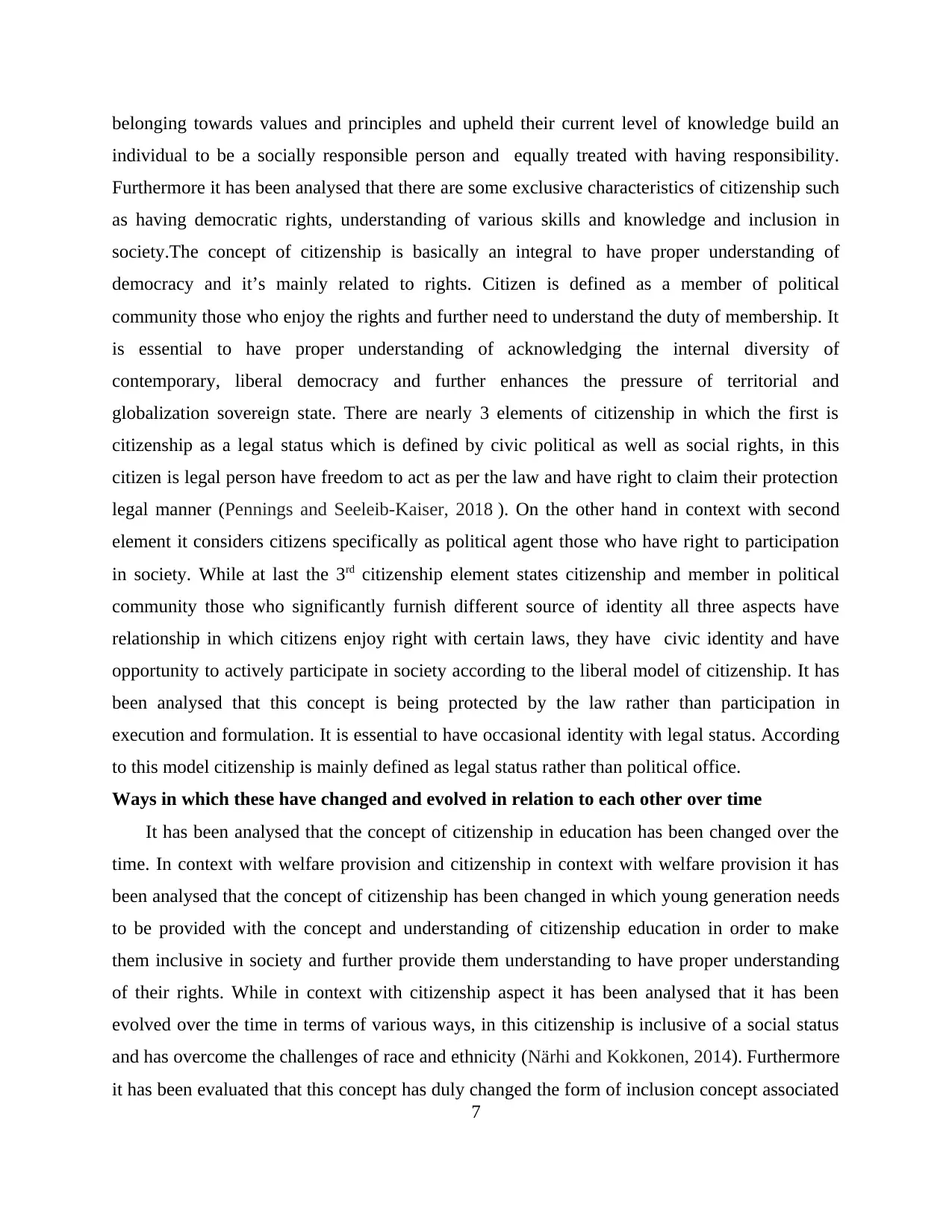
belonging towards values and principles and upheld their current level of knowledge build an
individual to be a socially responsible person and equally treated with having responsibility.
Furthermore it has been analysed that there are some exclusive characteristics of citizenship such
as having democratic rights, understanding of various skills and knowledge and inclusion in
society.The concept of citizenship is basically an integral to have proper understanding of
democracy and it’s mainly related to rights. Citizen is defined as a member of political
community those who enjoy the rights and further need to understand the duty of membership. It
is essential to have proper understanding of acknowledging the internal diversity of
contemporary, liberal democracy and further enhances the pressure of territorial and
globalization sovereign state. There are nearly 3 elements of citizenship in which the first is
citizenship as a legal status which is defined by civic political as well as social rights, in this
citizen is legal person have freedom to act as per the law and have right to claim their protection
legal manner (Pennings and Seeleib-Kaiser, 2018 ). On the other hand in context with second
element it considers citizens specifically as political agent those who have right to participation
in society. While at last the 3rd citizenship element states citizenship and member in political
community those who significantly furnish different source of identity all three aspects have
relationship in which citizens enjoy right with certain laws, they have civic identity and have
opportunity to actively participate in society according to the liberal model of citizenship. It has
been analysed that this concept is being protected by the law rather than participation in
execution and formulation. It is essential to have occasional identity with legal status. According
to this model citizenship is mainly defined as legal status rather than political office.
Ways in which these have changed and evolved in relation to each other over time
It has been analysed that the concept of citizenship in education has been changed over the
time. In context with welfare provision and citizenship in context with welfare provision it has
been analysed that the concept of citizenship has been changed in which young generation needs
to be provided with the concept and understanding of citizenship education in order to make
them inclusive in society and further provide them understanding to have proper understanding
of their rights. While in context with citizenship aspect it has been analysed that it has been
evolved over the time in terms of various ways, in this citizenship is inclusive of a social status
and has overcome the challenges of race and ethnicity (Närhi and Kokkonen, 2014). Furthermore
it has been evaluated that this concept has duly changed the form of inclusion concept associated
7
individual to be a socially responsible person and equally treated with having responsibility.
Furthermore it has been analysed that there are some exclusive characteristics of citizenship such
as having democratic rights, understanding of various skills and knowledge and inclusion in
society.The concept of citizenship is basically an integral to have proper understanding of
democracy and it’s mainly related to rights. Citizen is defined as a member of political
community those who enjoy the rights and further need to understand the duty of membership. It
is essential to have proper understanding of acknowledging the internal diversity of
contemporary, liberal democracy and further enhances the pressure of territorial and
globalization sovereign state. There are nearly 3 elements of citizenship in which the first is
citizenship as a legal status which is defined by civic political as well as social rights, in this
citizen is legal person have freedom to act as per the law and have right to claim their protection
legal manner (Pennings and Seeleib-Kaiser, 2018 ). On the other hand in context with second
element it considers citizens specifically as political agent those who have right to participation
in society. While at last the 3rd citizenship element states citizenship and member in political
community those who significantly furnish different source of identity all three aspects have
relationship in which citizens enjoy right with certain laws, they have civic identity and have
opportunity to actively participate in society according to the liberal model of citizenship. It has
been analysed that this concept is being protected by the law rather than participation in
execution and formulation. It is essential to have occasional identity with legal status. According
to this model citizenship is mainly defined as legal status rather than political office.
Ways in which these have changed and evolved in relation to each other over time
It has been analysed that the concept of citizenship in education has been changed over the
time. In context with welfare provision and citizenship in context with welfare provision it has
been analysed that the concept of citizenship has been changed in which young generation needs
to be provided with the concept and understanding of citizenship education in order to make
them inclusive in society and further provide them understanding to have proper understanding
of their rights. While in context with citizenship aspect it has been analysed that it has been
evolved over the time in terms of various ways, in this citizenship is inclusive of a social status
and has overcome the challenges of race and ethnicity (Närhi and Kokkonen, 2014). Furthermore
it has been evaluated that this concept has duly changed the form of inclusion concept associated
7
Paraphrase This Document
Need a fresh take? Get an instant paraphrase of this document with our AI Paraphraser
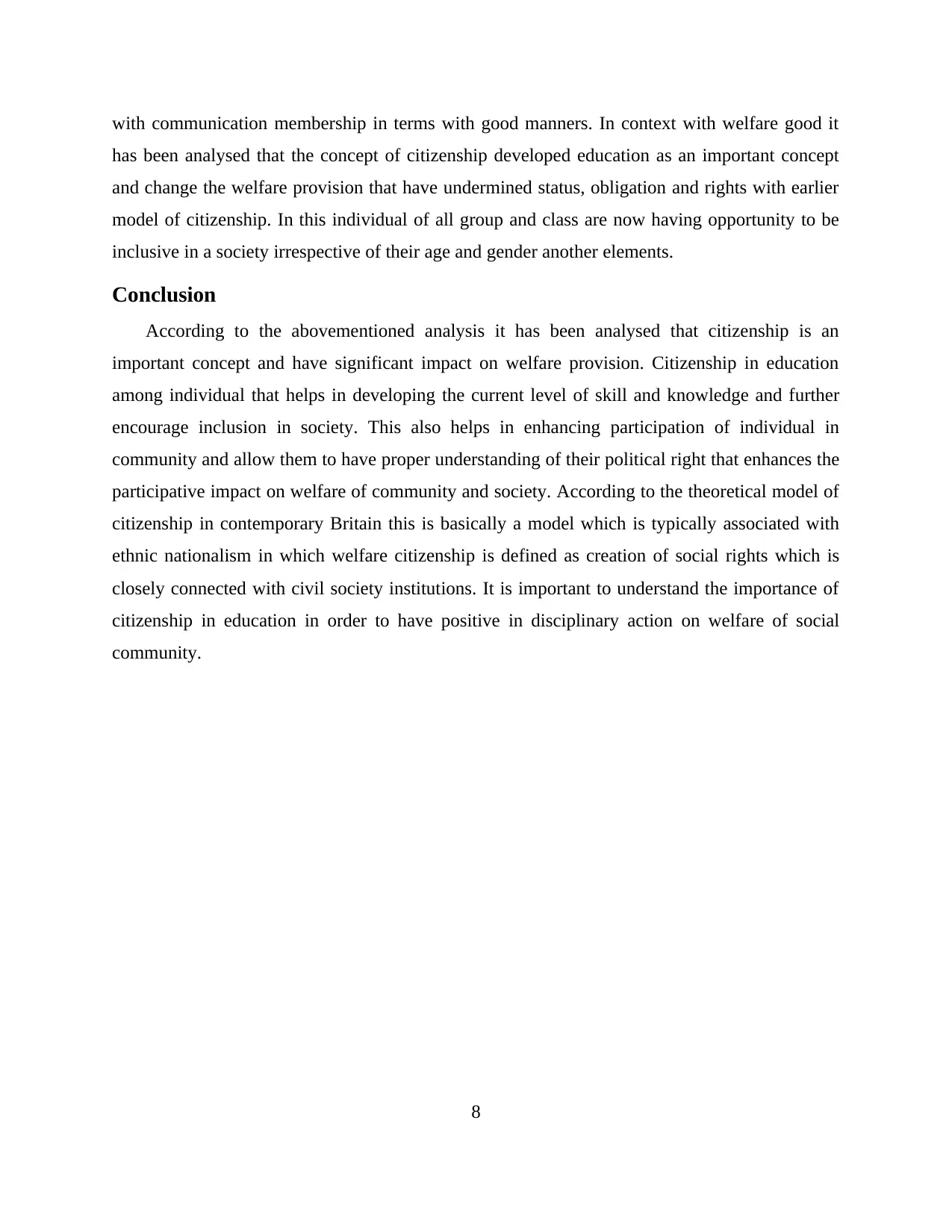
with communication membership in terms with good manners. In context with welfare good it
has been analysed that the concept of citizenship developed education as an important concept
and change the welfare provision that have undermined status, obligation and rights with earlier
model of citizenship. In this individual of all group and class are now having opportunity to be
inclusive in a society irrespective of their age and gender another elements.
Conclusion
According to the abovementioned analysis it has been analysed that citizenship is an
important concept and have significant impact on welfare provision. Citizenship in education
among individual that helps in developing the current level of skill and knowledge and further
encourage inclusion in society. This also helps in enhancing participation of individual in
community and allow them to have proper understanding of their political right that enhances the
participative impact on welfare of community and society. According to the theoretical model of
citizenship in contemporary Britain this is basically a model which is typically associated with
ethnic nationalism in which welfare citizenship is defined as creation of social rights which is
closely connected with civil society institutions. It is important to understand the importance of
citizenship in education in order to have positive in disciplinary action on welfare of social
community.
8
has been analysed that the concept of citizenship developed education as an important concept
and change the welfare provision that have undermined status, obligation and rights with earlier
model of citizenship. In this individual of all group and class are now having opportunity to be
inclusive in a society irrespective of their age and gender another elements.
Conclusion
According to the abovementioned analysis it has been analysed that citizenship is an
important concept and have significant impact on welfare provision. Citizenship in education
among individual that helps in developing the current level of skill and knowledge and further
encourage inclusion in society. This also helps in enhancing participation of individual in
community and allow them to have proper understanding of their political right that enhances the
participative impact on welfare of community and society. According to the theoretical model of
citizenship in contemporary Britain this is basically a model which is typically associated with
ethnic nationalism in which welfare citizenship is defined as creation of social rights which is
closely connected with civil society institutions. It is important to understand the importance of
citizenship in education in order to have positive in disciplinary action on welfare of social
community.
8
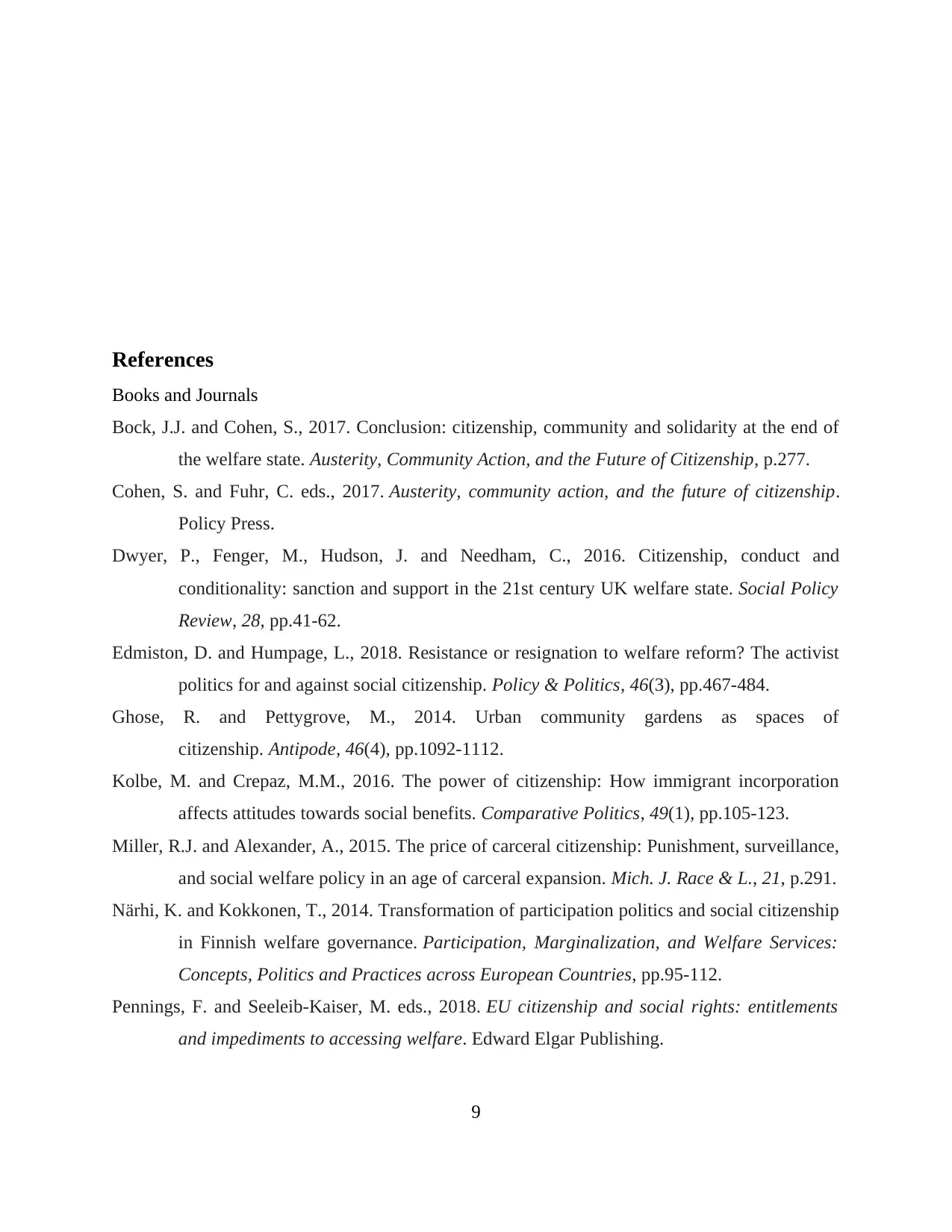
References
Books and Journals
Bock, J.J. and Cohen, S., 2017. Conclusion: citizenship, community and solidarity at the end of
the welfare state. Austerity, Community Action, and the Future of Citizenship, p.277.
Cohen, S. and Fuhr, C. eds., 2017. Austerity, community action, and the future of citizenship.
Policy Press.
Dwyer, P., Fenger, M., Hudson, J. and Needham, C., 2016. Citizenship, conduct and
conditionality: sanction and support in the 21st century UK welfare state. Social Policy
Review, 28, pp.41-62.
Edmiston, D. and Humpage, L., 2018. Resistance or resignation to welfare reform? The activist
politics for and against social citizenship. Policy & Politics, 46(3), pp.467-484.
Ghose, R. and Pettygrove, M., 2014. Urban community gardens as spaces of
citizenship. Antipode, 46(4), pp.1092-1112.
Kolbe, M. and Crepaz, M.M., 2016. The power of citizenship: How immigrant incorporation
affects attitudes towards social benefits. Comparative Politics, 49(1), pp.105-123.
Miller, R.J. and Alexander, A., 2015. The price of carceral citizenship: Punishment, surveillance,
and social welfare policy in an age of carceral expansion. Mich. J. Race & L., 21, p.291.
Närhi, K. and Kokkonen, T., 2014. Transformation of participation politics and social citizenship
in Finnish welfare governance. Participation, Marginalization, and Welfare Services:
Concepts, Politics and Practices across European Countries, pp.95-112.
Pennings, F. and Seeleib-Kaiser, M. eds., 2018. EU citizenship and social rights: entitlements
and impediments to accessing welfare. Edward Elgar Publishing.
9
Books and Journals
Bock, J.J. and Cohen, S., 2017. Conclusion: citizenship, community and solidarity at the end of
the welfare state. Austerity, Community Action, and the Future of Citizenship, p.277.
Cohen, S. and Fuhr, C. eds., 2017. Austerity, community action, and the future of citizenship.
Policy Press.
Dwyer, P., Fenger, M., Hudson, J. and Needham, C., 2016. Citizenship, conduct and
conditionality: sanction and support in the 21st century UK welfare state. Social Policy
Review, 28, pp.41-62.
Edmiston, D. and Humpage, L., 2018. Resistance or resignation to welfare reform? The activist
politics for and against social citizenship. Policy & Politics, 46(3), pp.467-484.
Ghose, R. and Pettygrove, M., 2014. Urban community gardens as spaces of
citizenship. Antipode, 46(4), pp.1092-1112.
Kolbe, M. and Crepaz, M.M., 2016. The power of citizenship: How immigrant incorporation
affects attitudes towards social benefits. Comparative Politics, 49(1), pp.105-123.
Miller, R.J. and Alexander, A., 2015. The price of carceral citizenship: Punishment, surveillance,
and social welfare policy in an age of carceral expansion. Mich. J. Race & L., 21, p.291.
Närhi, K. and Kokkonen, T., 2014. Transformation of participation politics and social citizenship
in Finnish welfare governance. Participation, Marginalization, and Welfare Services:
Concepts, Politics and Practices across European Countries, pp.95-112.
Pennings, F. and Seeleib-Kaiser, M. eds., 2018. EU citizenship and social rights: entitlements
and impediments to accessing welfare. Edward Elgar Publishing.
9
⊘ This is a preview!⊘
Do you want full access?
Subscribe today to unlock all pages.

Trusted by 1+ million students worldwide
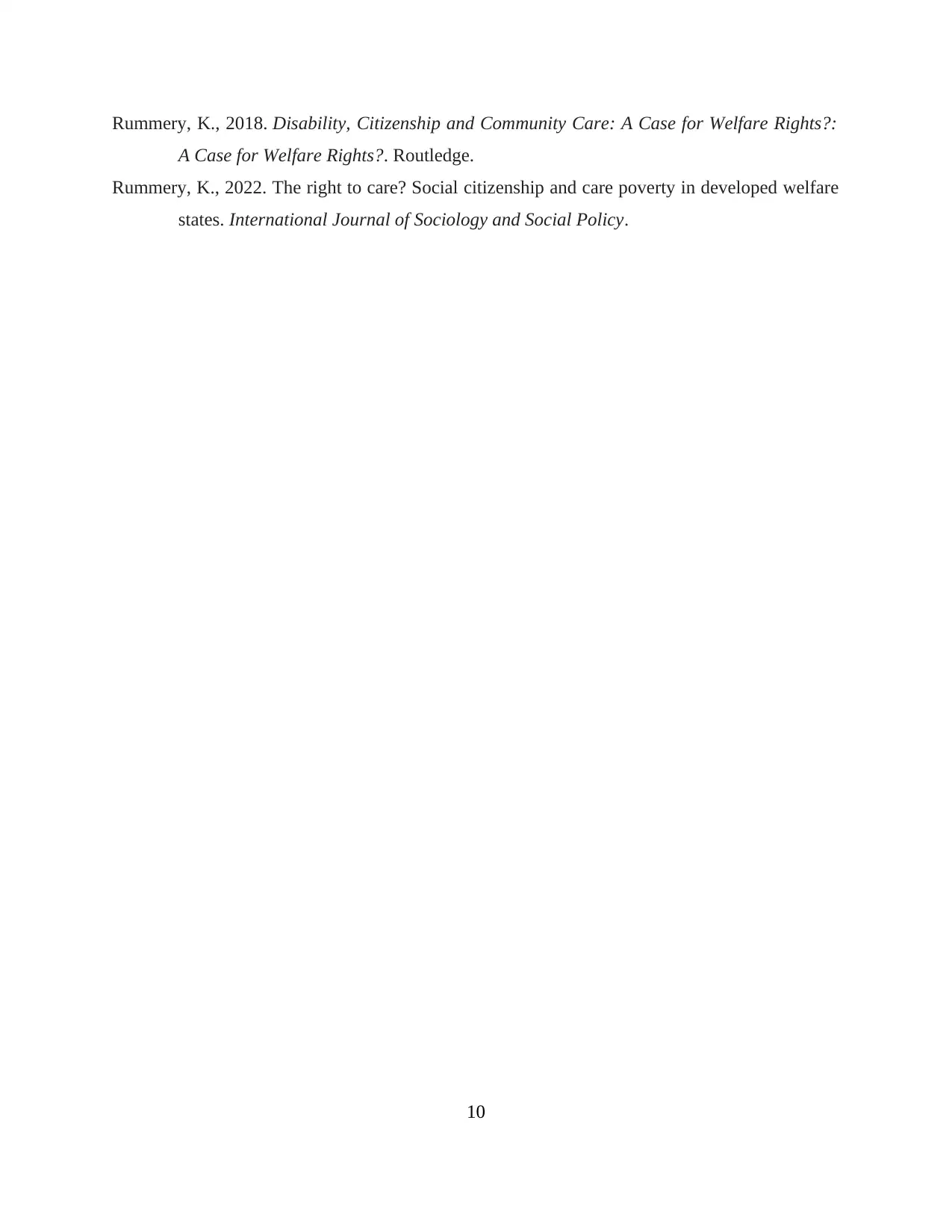
Rummery, K., 2018. Disability, Citizenship and Community Care: A Case for Welfare Rights?:
A Case for Welfare Rights?. Routledge.
Rummery, K., 2022. The right to care? Social citizenship and care poverty in developed welfare
states. International Journal of Sociology and Social Policy.
10
A Case for Welfare Rights?. Routledge.
Rummery, K., 2022. The right to care? Social citizenship and care poverty in developed welfare
states. International Journal of Sociology and Social Policy.
10
1 out of 10
Related Documents
Your All-in-One AI-Powered Toolkit for Academic Success.
+13062052269
info@desklib.com
Available 24*7 on WhatsApp / Email
![[object Object]](/_next/static/media/star-bottom.7253800d.svg)
Unlock your academic potential
Copyright © 2020–2026 A2Z Services. All Rights Reserved. Developed and managed by ZUCOL.





